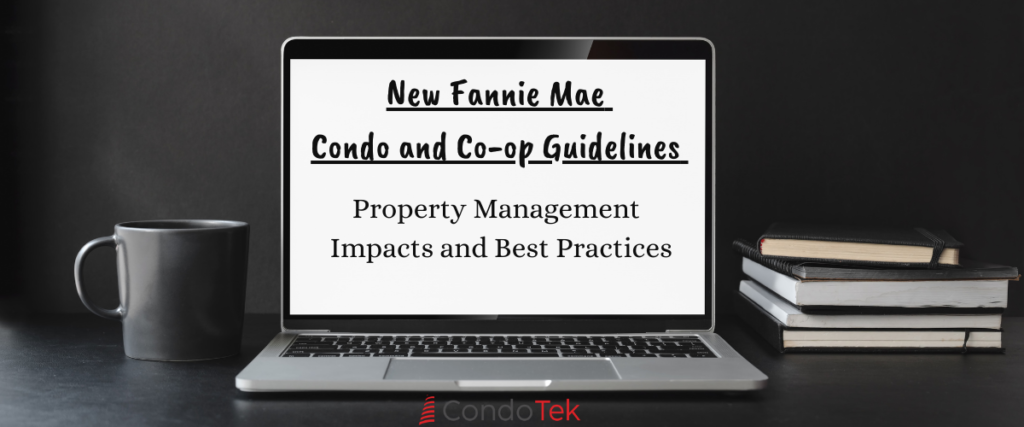
Fannie Mae Lender Letter LL-2021-14
Lenders across the nation have begun to digest the newest lending guidelines issued by Fannie Mae in Lender Letter 2021-14 released on October 14th, 2021. The new guidelines outline Fannie Mae’s new risk tolerance for purchasing condominium and cooperative loans on both new construction and established properties. The focus of these new directives is on ensuring that condominium properties have appropriate capital funding for reserves, and more importantly, to create a vetting process to ensure that properties with deferred maintenance to structural and mechanical components can be properly reviewed before mortgage financing is offered to borrowers.
These new guidelines will greatly impact condo and Co-op properties and the property management organizations that provide key guidance to board members.
New Key Directives
Significant Deferred Maintenance and Unsafe Conditions
The crux of Fannie Mae’s temporary guidance is to ensure that condominium and cooperative properties are habitable and free of dangerous and unsafe conditions. Outlined in the excerpt below, significant deferred maintenance will render a project ineligible until it can be determined that a property is brought to the outlined standards. For managers, determining this eligibility criteria may require a violation search and a detailed review of special assessments to determine compliance.
Loans secured by units in condo and co-op projects with significant deferred maintenance or in projects that have received a directive from a regulatory authority and/or inspection agency to make repairs due to unsafe conditions are not eligible for purchase by the agency. These projects will remain ineligible, rendering financing through Fannie Mae “unavailable”, until the required repairs have been made and documented appropriately. Once the issues have been resolved an application can be made to Fannie Mae to reinstate the project and allow mortgage financing in the project.
These policies do not apply to routine maintenance or repairs that a homeowners’ association (HOA) undertakes to maintain or preserve the integrity and condition of its property, however, routine repairs and maintenance must be thoroughly outlined and documented.
The “Unavailable” Status
Fannie Mae has immediately begun a process of classifying a condo or Co-op property as “unavailable”. This designation will remove the ability for any borrower to obtain Fannie Mae mortgage financing within the property. An “unavailable” designation will be given to a community based upon key information provided to Fannie Mae by mortgage lenders, as a result of violations issued by city or State agencies or due to a catastrophic event which impedes habitability of the property.
In the first 3 weeks since the guidelines were issued over 930 properties were added to Fannie Mae’s “unavailable” list.
A property that has been deemed “unavailable” for lending can have the ability to obtain mortgage financing restored by applying to Fannie Mae for a global PERS approval. The process to obtain PERS approval requires the removal of the violation, completion of needed repairs and updated financial and/or reserve information. CondoTek provides a complete application, alignment, review and submission service for HOA’s in order for them to obtain Fannie Mae PERS approval proactively or in order to overturn an “unavailable” designation and reinstate the project to allow mortgage financing.
New Construction Condo Reserve Study Acceptance Suspense
Fannie Mae is immediately suspending the process of allowing a new construction condo property to utilize a Reserve Study to determine appropriate reserve funding in lieu of utilizing the 10% reserve requirement. Although many portfolio lenders and investors continue to require reserve studies to determine lending eligibility for new condo properties, Fannie Mae will no longer accept the prescription for reserve offered within them.
New construction property managers must provide key lending and budget guidance to developers to ensure appropriate reserve funding is established within operating budgets. Key insights will include a review of the development to ensure that Fannie Mae financing is necessary and weigh that decision with the marketability of a property with increased maintenance fees.
In many new condo properties reserve studies will continue to be utilized to establish appropriate funding where Fannie Mae financing is unnecessary and/or redundant due to global portfolio lending approval.
Established Condo and Co-op Reserve Study Acceptance Suspense
Lenders can no longer accept a Reserve Study in lieu of a 10% budgeted reserve requirement for an established condominium or cooperative property. If an established condo or Co-op property has less than 10% budgeted for reserves in their operating budget, then loans within the property are ineligible for sale to Fannie Mae. An established project that is utilizing a Reserve Study with a reserve contribution that is less than 10% of the operating budget can be submitted for review and approval through the PERS process.
Property managers must complete a sweeping assessment of all the properties under management to ensure compliance where appropriate. Good questions to ask are as follows:
Is the current reserve contribution appropriate?
Does the property have a valid reserve study?
Is Fannie Mae mortgage financing necessary in this site?
Does deferred maintenance exist within the property?
Is the current capital reserve balance enough to cover future repairs?
Special Assessments
Although the new Fannie Mae guidance does not render projects with special assessments ineligible, it does outline the need to obtain the necessary financial documentation to confirm that an association has the capital and wherewithal to fund any needed repairs. Special assessments related to safety, soundness, structural integrity, and habitability must be reviewed to determine if related repairs are completed or the project is ineligible.
Best Practices
The best practices section of these new temporary guidelines outlines several additional steps that may be appropriate for lenders to take to determine eligibility.
As a best practice, the lender should review the past six months of a project’s HOA meeting minutes and obtain information about any maintenance or construction that may have significant safety, soundness, structural integrity, or habitability impacts on the unit or the project. References to items such as improvements, renovations, inadequate reserve funding, budget deficits, and negative cash-flows should be researched to determine if these items are related to deferred maintenance or other conditions that impact the safety, soundness, structural integrity or habitability.
Guidance for Property Managers
The underwriting, analyst and project validation teams at CondoTek work alongside hundreds of property management organizations across the nation. Our team provides guidance to management firms and lenders on more than 35,000 condominium and cooperative properties each year. Our goal is to ensure that our management and lender clients have the most up to date information on industry requirements.
Suggested Best Practices for Condo and Co-op Property Managers
-Ongoing review of meeting minutes on managed properties to ensure appropriate reporting of issues pertaining to structure, habitability and deferred maintenance upon lender request.
-Review of all managed properties to ensure that they are listed as “available” for Fannie Mae mortgage financing.
-Analysis of reserve balance, reserve funding and Reserve Study to ensure that repair and replacement to structural and mechanical components can be performed without creating a special assessment.
-Analysis of active special assessments in each managed property to ensure they are compliant with new regulations and can pass the outlined risk analysis guidelines.
-Requiring a Reserve Study for each property to ensure that a third-party expert is providing property condition information instead of a managing agent.
-Aggregating all recent engineering and/or Reserve Study reports for review by lenders and/or Fannie Mae.
-Determination of Fannie Mae lending viability based on unit value and/or borrower need for each managed property.
-Establishing Portfolio Lending availability in properties that are unable to comply with Fannie Mae regulations.
-Review of Co-op underlying mortgages to ensure that properties are following these new guidelines before requesting additional capital or prior to underlying mortgage refinance.
The team and I at CondoTek are widely available for consultation and discussion about these new guidelines and their impacts to condominium and cooperative properties. We are happy to join board meetings and have thoughtful discussions on how each project should proceed.
Orest Tomaselli
President of Project Review
Can’t Miss Event!
Join us on Thursday November 18th at 2:30PM EST for a thoughtful webinar outline of the newest policies and procedures for condo and co-op lending.
Sign up here.


